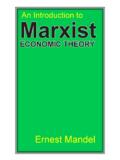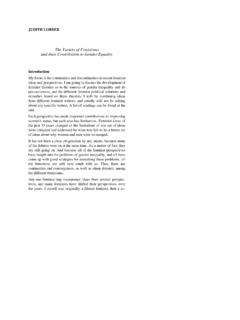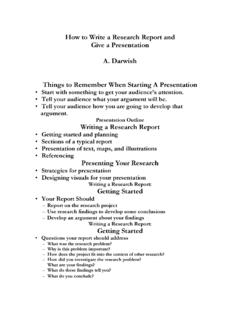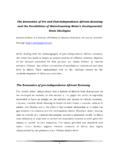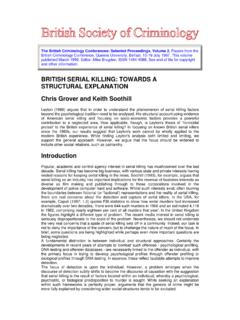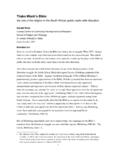Transcription of INTRODUCTION to - Marxist School of Sacramento
1 Leacock IntroductionINTRODUCTIONtoOrigin of the Family, Private Property and the State, by Frederick Engelsby Eleanor Burke LeacockIN THE Origin of the Family, Private Property and the State, Engels outlines the successive social and economic forms which underlay the broad sweep of early human history, as mankind gained increasing mastery over the sources of subsistence. The book was written after Marx s death, but was drawn from Marx s as well as Engels own notes. It was based on the work, Ancient Society, which appeared in 1877 and was written by the anthropologist Lewis Henry Morgan, who, as Engels wrote in 1884, in his own way.
2 Discovered afresh in America the materialistic conception of history discovered by Marx 40 years ago. The contribution Marx and Engels made to Morgan s work was to sharpen its theoretical implications, particularly with regard to the emergence of classes and the state. Although Engels book was written well before most of the now available material on primitive and early urban society had been amassed, the fundamentals of his outline for history have remained valid. Moreover, many issues raised by Morgan s and then Engels work are still the subjects of lively debate among anthropologists, while the theoretical implications of these issues are still matters of concern to Marxist scholars described the evolution of society in some 560 pages.
3 Engels book is far shorter, summarizing Morgan s material and focusing sharply on the major differences between primitive society and civilization with its fully developed classes and political organization. The questions Engels deals with pertain to three major topics: (a) devel-opmental stages in mankind s history, (b) the nature of primitive society with regard to property, rank, family forms and descent systems, and (c) the emergence of commodity production, economically based classes and the state. A fourth subject of importance to contemporary anthropological research and but briefly referred to by Engels involves pri-mate social organization and its relevance for an insight into early man.
4 Engels separate but incomplete paper on the subject, The Part Played by Labor in the Transition from Ape to Man, has been included in this volume as an INTRODUCTION MORGAN S ANCIENT SOCIETYTHE IDEA central to Morgan s Ancient Society, that human history could be defined in terms of successive stages, was an old one hinted at in classical Greek and Chinese writings, and well established in 19th century thought. However, theorists have not al-ways separated stages in the evolution of culture as a whole-the background for historical events-from historical sequences specific to a single area. The early 18th century Ital-ian historian, Giovanni Battista Vico, proposed a theory of historical cycles which were cultural in nature in that they comprised both institutional and ideological components of society.
5 However they were tied too closely to European history to qualify as evolution-ary. According to Vico s proposal, the divine stage represented by early Greece gave way to the heroic of classical times, which was superseded by the stage of man in later Greece and in the Mediterranean world. The cycle was repeated in northern Eu-rope, with the divine Dark Ages and the heroic Medieval, leading to the 18th century stage of man. In content, Vico s periods were suggestive of Comte s later sequence in the development of knowledge from theological, through metaphysical, to scien-tific. The first four stages of human history proposed by Condorcet at the end of the 18th century were fully cultural.
6 The first was characterized by hunting and fishing, the sec-ond by herding, the third by tilling of the soil, and the fourth by commerce, science and philosophy. Condorcet s later periods, however, were more specific to European history. They were marked by the decline of Rome, the Crusades, the invention of printing, the Protestant Revolt, and the establishment of the French Republic. In the 1850s, the pioneer anthropologist Gustave Klemm, who collated ethnographic materials on societies around the world, projected an outline of man s development from nomadic, egalitarian hunt-ing society ( savagery ), through settled agricultural society organized politically and in great part dominated by religious institutions ( tameness ), to the civilizations of the classical Arabic, Greek, Persian and Roman worlds ( freedom ).
7 The extent to which Morgan was directly acquainted with writings such as these is not clear, but in any case, his initial interest was not in tracing the major periods of cul-tural development. Instead, the theory of history embodied in Ancient Society grew out of questions raised by his empirical researches. Morgan s discovery of what seemed to be an unusual system of naming kinsmen used by the Iroquois Indians in his native state of New York led him to unearth the fact that similar systems existed independently thou-sands of miles away. This set him to collecting information on kinship systems among other American Indians, to which he added material from around the world by writing to missionaries, traders and government result was data on a bewildering variety of terminologies used for naming rela-tives in many different societies.
8 Morgan s first attempt to reduce his material to some or-der was beset with difficulties and was declared unsatisfactory by the publisher to whom he presented his manuscript. As a result, Morgan worked through to a theory of sequen-tial stages in marriage represented by differing terminological systems, a theory he pro- Leacock Introductionpounded in his Systems of Consanguinity and Affinity of the Human Family, published in 1871. The assumption upon which his theory was based, that kin terms represent actual or possible biological relationships, has been superseded by the understanding that the literal biological meaning of terms are often secondary to their social implications.
9 However, Morgan s work was of tremendous importance not only to the formulation of problems in the comparative study of social institutions, but also in setting Morgan on the track that was to result, near the end of his life, in the publication of Ancient Society. The question posed by his study of kinship systems stayed with him. What had been the sequence of institutional forms in man s early history? For Morgan, this problem raised a more funda-mental issue. What was the basis for the emergence of new and successive social forms?Morgan found the answer to this question in the Darwinian interpretation of biologi-cal evolution.
10 Morgan was familiar with and very much interested in Herbert Spencer s writings on social evolution in which Spencer spoke about the growing complexity and increasing specialization and differentiation of function in social institutions. However, it was not until Darwin seized upon the Spencerian concept of functional adaptation and interpreted it as the pivotal mechanism whereby successively higher biological forms had evolved that Morgan found the clue he had been had remained dubious about the hypothesis of human evolution until he met and talked with Darwin when on a European tour. After this meeting, he wrote that he was compelled to accept the conclusion that man commenced at the bottom of the scale and worked himself up to his present status, and that the struggle for existence was involved.
